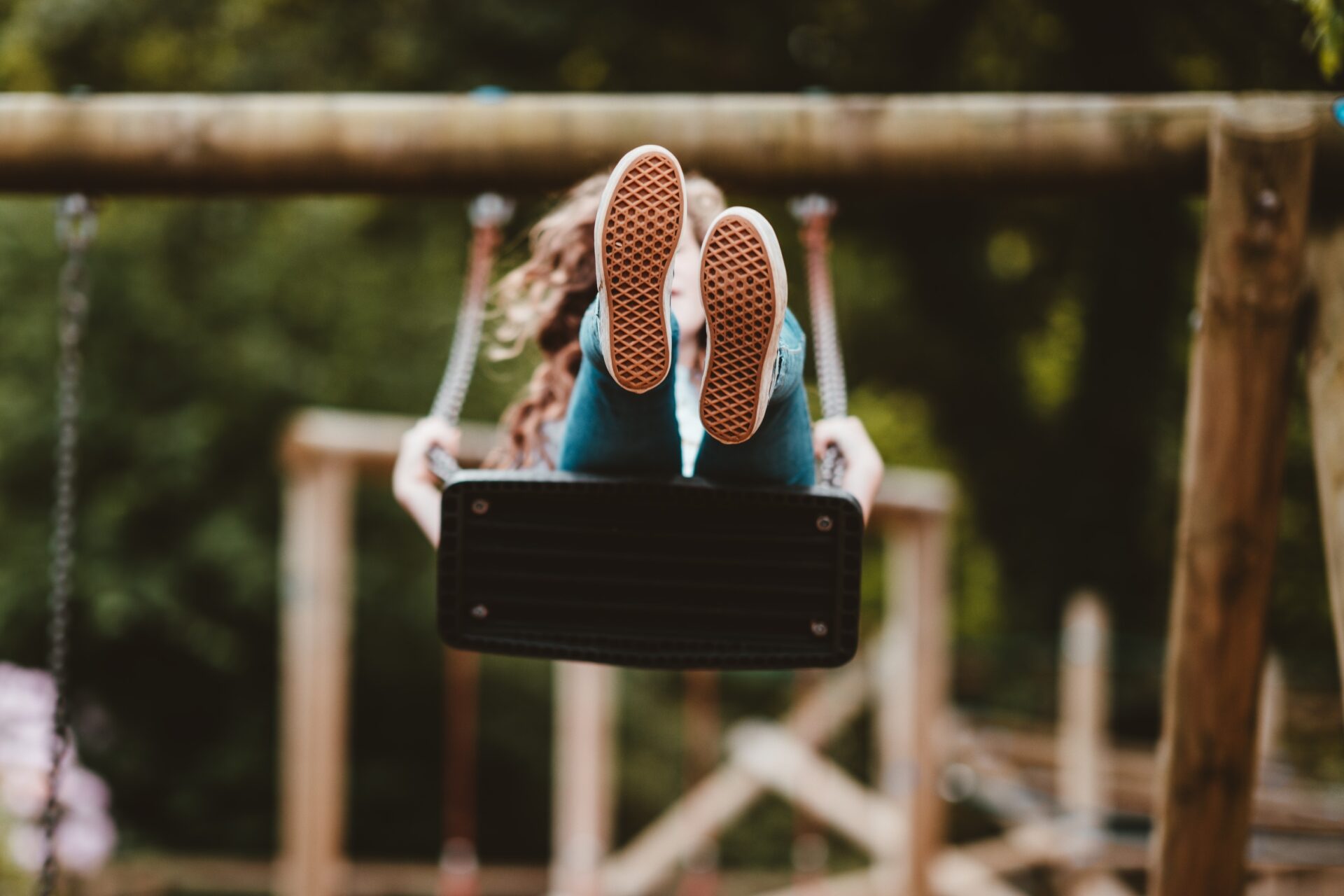Family Life
6 min Read
Are kids forgetting how to play?

July 1, 2021
Family Life
6 min Read

July 1, 2021

A few months ago, the phone rang in the middle of the day. I recognized the number as belonging to my children’s school, so I nervously answered. I have received calls from the school in the past ranging in severity, but always with a similar theme. On one occasion, I arrived at the school to find one of my kids proudly perched in the front foyer, icing an injury from a slip on the playground.
Another time, it was a goose egg on the head from standing up directly beneath the blackboard in the kindergarten classroom. It is school policy to notify parents of these injuries.
This time, my nine-year-old had fallen at recess and broken her elbow while doing a cartwheel. After my first ever trip to the emergency room as a parent, we returned to the school hours later, tears wiped clean, arm in a sling, to hear some surprising news.
Cartwheels had been banned at school.
I was shocked that our school had such an extreme response to a rare injury by a child attempting to freely express herself in the form of a cartwheel. Sure, she had no previous gymnastics experience, but kids will be kids. It should be noted that blackboards are still readily available in every classroom, despite my child’s previous injury.
In addition to banning the cartwheel and the more obvious threat—the snowball—the school has eliminated empty toilet paper rolls for arts and crafts and implemented a “no hands, no feet” rule with regards to rough play.
Our school isn’t the only one that has jumped on the safety band-wagon. There is a board-wide policy prohibiting the use of skateboards, roller blades or shoes with roller balls on them. Other schools have banned skipping ropes and balls of any shape or size (with the exception of Nerf products) after a parent was hit in the head on school property.
With this extreme effort to keep our kids safe, it makes me wonder, are we actually limiting their ability to play and stay physically fit?
According to a recent survey by ParticipACTION, about half of Canadian parents of school-aged children (50.4 percent) played active outdoor games, such as hide-and-seek and tag, every day as a child; however, today only 19 percent of their children do. Almost half of Canadian children get three hours or less of active play per week (including weekends).
Play is powerful, says Kelly Murumets, President and CEO of ParticipAction. “It has the potential to improve a child’s physical, emotional, social and cognitive well-being.”
Bans are a preventive measure to ensure parents don’t take legal action against principals, teachers or an entire board, however, I fear bans eliminate the creative outlets necessary for our children’s personal growth, stripping our schools of the fundamentals our kids need for inspiration and ultimately, exercise.
Rather than banning cartwheels and other forms of play, shouldn’t we be doing more to encourage them? The way our kids play at recess directly influences the way they play during their free time.
Many kids don’t have the freedom to ride their bikes for hours after dinner or gather in a neighbourhood meeting spot for a friendly game of hide-and-seek until the voice of the loudest parent echoes through the streets. Parents’ fear of who might be lurking around outweighs their interest in their kids’ staying active. The idea is that it’s safer to keep kids indoors. Instead of active outdoor play, kids are turning to gadgets, computers and smart phones to fi ll their free time.
Michelle Silver McKeen, a Calgary mother of two boys, sets strict limits on screen time. “It’s amazing what kids will come up with when screen time isn’t an option.” She also refrains from over-scheduling her boys so they have freedom and time to play, which makes life less stressful for the entire family.
Playing—something that used to be inherent in all of us—seems to be slipping away, but experts will tell us it’s worth saving.
“Active play helps kids learn from their mistakes, make friends, be creative, problem solve, test boundaries and shape their own identities,” says Kelly.
But, as we eliminate open-ended games and freestyle play in favour of scheduled activities, I have this niggling fear: that the bans, excessive screen time and abduction anxiety will, over generations, wear away at our instinct to play. Will kids forget how?
Lorie Walton, a certified child psychotherapist, Play Therapist Supervisor and owner of Family First Play Therapy Centre Inc., has spent her life studying child development.
“Children are concrete learners and learn by using all of their senses. They must physically and emotionally experience their world as children in order to make sense of it as adults.”
How will kids learn these important developmental behaviours and how to successfully apply them in the long-term if their heads are buried in a gaming device? Lorie fears “children of this generation are not going to know nonverbal cues provided by facial expression and as such, won’t understand how to expel their stresses without knowing the benefits of physical interaction through rough and tumble play.
“If children continue to interact through electronic devices, they lose the ability to use social cues and situations to solve problems.”
Lorie also says the physical aspects of play are integral to the developing child. “Children learn how to regulate their physiological emotional states through positive touch.
“If peer relations throughout the developing years don’t include facial connections or physical interactions, then will the next generation be missing out on key components necessary for healthy human interactions?”
Kym Grippo and Janet Omstead, co-founders of LifeSports Inc. (lifesports.ca) maintain hope. “If you hand kids a stick or a ball, they’ll come up with a number of ways to play.” We need to allow them the opportunity to explore. Ultimately it will get them moving. Kids like being tasked with a new challenge and are willing participants.
LifeSports focuses on creative movement programming for all ages and originally began as an in-school PhysEd program that was based on having fun rather than team sports or competition, which can be a turn off for many kids. Kym and Janet suggest that by being an active role model and encouraging kids to use their imaginations, parents can help kids come up with ways to play and stay active.
In the meantime, shin-pads and helmets at the ready, I’m working on bringing back the cartwheel.
Everyone can get outside and move with their kids. It can be as simple as using a stop watch and dedicating 10 minutes of your time to unstructured, outdoor activity. LifeSports recommends that parents:
Originally published in ParentsCanada magazine, October 2013.